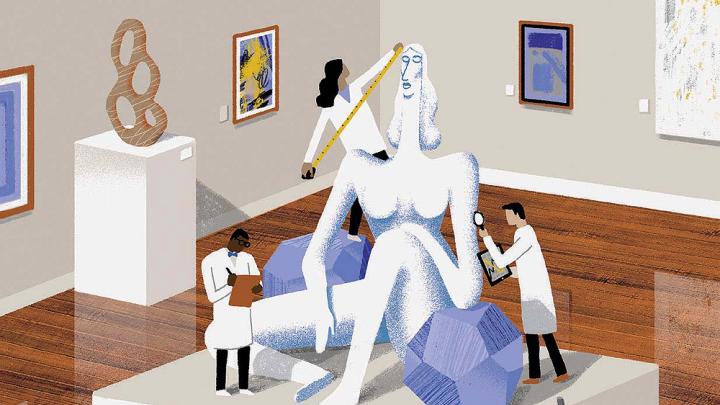Prisoners rehearse and perform The Tempest behind walls. People reportedly queued on the New York docks in 1841 awaiting the ship bearing the final chapter of Dickens’s The Old Curiosity Shop to find out Little Nell’s fate. A granddaughter churns out “abstract impressionist” paintings. What do these examples—arrayed by Boston College psychology professor Ellen Winner ’69, Ph.D. ’78, RI ’99—have in common, and how do they function? Those are the subjects of her simply, but provocatively, titled How Art Works: A Psychological Exploration (Oxford, $29.95). It moves beyond philosophy and aesthetics to social science, to “unpack what art does to us—how we experience art.” Continuing beyond her introductory list:
These strange behaviors we call art are as old as humans. As early as Homo sapiens, and long before there was science, there was art. Archeologists have found ochre clay incised with decoration from 99,000 years ago, musical instruments from over 35,000 years ago, and masterful figurative paintings on the Chauvet cave walls from 30,000 years ago. There has never been a culture without one or more forms of art—though not all cultures have had a word for art. Anthropologist Claude Lévi-Strauss placed art above science, describing the work of the painter, poet, and composer as well as the myths and symbols of primitive humans as “if not as a superior form of knowledge, at any rate as the most fundamental form of knowledge, and the only one that we all have in common; knowledge in the scientific sense is merely the sharpened edge of this other knowledge.” In modern, literate societies, there is no end to wondering about “art” and “the arts.” What makes something art? Do two-year-old Olivia’s paintings count? If I say that Harry Potter is a greater novel than War and Peace, is this just a subjective opinion, or could I be proven wrong? Are the primitive-looking paintings of Jean-Michel Basquiat that sell for millions something any child could have made? If a revered painting turns out to be a forgery, does it become less good? Does the sorrow we feel when we read about the death of Little Nell have the same quality as the sorrow we feel when someone we know dies? Did reading about Little Nell make us better, more empathetic people? Do we make our children smarter by enrolling them in music lessons?…
Over the centuries, philosophers have tried (and failed) to define art. Psychologists (perhaps wisely) ask a somewhat different question: not “what is it,” but rather what do people think it is. And this is an empirical question.








